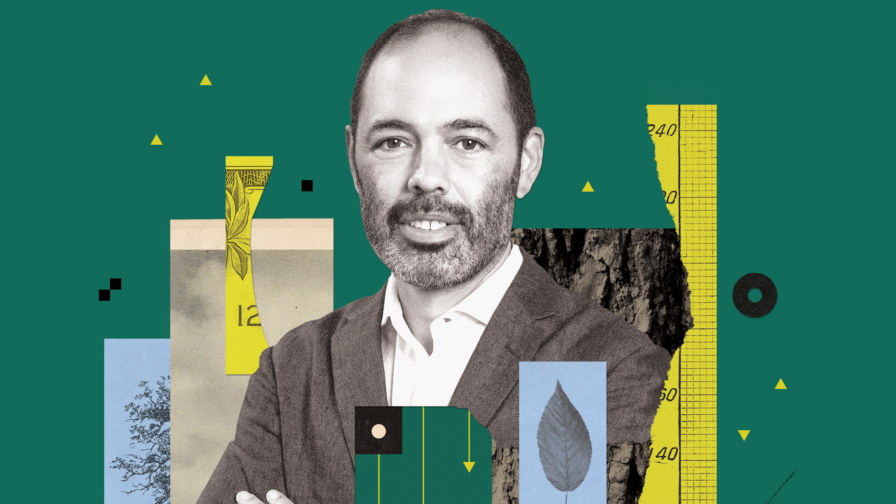
ESG at a Crossroads
By Michael Blanding
Darden Research Puts ESG Investing Under the Microscope and Finds a Path for More Impact
The past decade has seen a dramatic rise in ESG investing — industry shorthand for investments that take environmental, social and governance issues into account. In part, that’s a response to corporate scandals going back years, says Professor Pedro Matos, academic director of Darden’s Richard A. Mayo Center for Asset Management.
“On the governance dimension, ESG investing goes all the way back to Enron and the fraud by executives and directors that existed there,” he says. “On the environment, it’s been industrial disasters like BP’s oil spill and Volkswagen’s Deiselgate emissions scandal. And on the social side, you have issues like Facebook’s data privacy breach, not to mention more recent controversies on how companies treated their workforces, customers and communities during the COVID-19 pandemic.”
Rising interest, says Matos, spurred investment managers — including the “big three” of BlackRock, State Street and Vanguard — to tout ESG-focused offerings, for both idealistic and practical reasons. On the one hand, “they have felt an increased responsibility for helping us live in a more sustainable society,” Matos says. On the other, “these things can blow back” and harm investors when sustainability issues aren’t addressed.
How much are investor efforts making a difference in creating a more sustainable world, however?
Curious to see, Matos and his team at the Mayo Center conducted a series of studies looking at how ESG investing efforts translated into actual practices on ESG issues. They found that, overall, investors are much more likely to “talk the talk” on ESG issues rather than “walk the walk,” and even well-meaning efforts don’t necessarily bear fruit in real outcomes. If investors really want to make a difference, he concludes, they need to fundamentally rethink the way they implement ESG.
websites or to investors, but we need to make sure everyone
is following the same framework and that ESG data is reliable.
There are many shades of green, and we need to know
everyone means the same green."
Legal Issues, Politics, Greenwashing Hold ESG back
Matos began by looking at the United Nations-sponsored Principles for Responsible Investment (PRI), a set of six guidelines launched in 2006 that have become the most influential roadmap for investment firms and asset owners seeking to drive ESG improvements. Institutional investors that sign onto the PRI make a pledge to report their annual progress. This meant Matos could examine investors including mutual funds, pension funds, sovereign wealth funds and insurance companies to examine the progress they reported and compare it to the actual makeup of their equity portfolios, as determined by scores from three leading ESG data providers. He shared his findings in a paper published in the Review of Finance, co-written with Simon Glossner, a former Mayo Center post-doctoral researcher now at the Federal Reserve Board; Ranja Gibson-Brandon and Philipp Krueger of the University of Geneva; and Tom Steffen of Osmosis Investment Management.
The researchers found that, on average, PRI signatory investors reported integrating ESG into approximately two-thirds of the equity investment decisions they made, either by excluding companies with poor ESG practices, actively including best-in-class stocks, or creating theme-based funds around certain environmental or social issues. They found that European investors that signed onto PRI had better portfolio ESG scores versus non-signatories. Furthermore, the portfolios of PRI investors based in the United States scored no different than those of non-PRI institutions — and in some cases, scored worse.
How could that be? In part, says Matos, U.S.-based institutional investors are hamstrung by legal constraints that require that they follow fiduciary duty principles and prioritize risk-adjusted financial returns over environmental or social considerations. There has also been a backlash against ESG investing, including anti-ESG legislation proposed at state and federal levels. But he and his fellow researchers also found a fair amount of “greenwashing” by investment firms.
“A number of investment firms market themselves employing ESG principles, including their PRI membership, but then we find they do little to walk the walk,” Matos says. “There’s a gap between what they say and what they do.”
Cleaning Up Portfolios, Not The Planet
Matos and his team identified a fundamental problem with ESG investing as it is practiced by many institutions: by choosing not to invest in stocks of corporations with poor ESG track records, they aren’t necessarily impacting company behaviors. In fact, the strategy might be counterproductive, Matos says, since it limits the influence an ESG-minded investor can have over a corporation.
“If the predominant investment strategy is to decarbonize your portfolio, then you’re just shifting the problem onto shareholders who may be less inclined or willing to engage,” Matos says. “You might be making your portfolio greener, but you aren’t helping to make the planet greener.”
In a new working paper, co-written with Glossner, Krueger and Mayo Center post-doc Vaska Atta-Darkua, the researchers found evidence that is, in fact, the case. The paper used data from the Carbon Disclosure Project (CDP), an international nonprofit launched in 2000, and the more recent Climate Action 100+, created in the wake of the 2015 Paris climate change agreement. Both initiatives represent ambitious efforts to help decarbonize the economy through corporate disclosure and investor engagement.
By matching corporate emissions with investor portfolios, the researchers found that institutional investors overall have been actively decarbonizing their portfolios over the last 15 years, and that investors that join the CDP decarbonize faster than those that don’t. However, they found no significant reduction in greenhouse gas emissions by the high-emitting companies, leading researchers to conclude that these investor portfolio reductions are due to divesting out of high-emitting companies and reweighting toward low-emitting companies, rather than engaging with companies to reduce their emissions.
The existing portfolio decarbonization strategy of divestment is not likely to be effective any time soon, Matos says. “If the CDP and Climate Action 100+ investors were the entirety of institutional money, they could potentially starve companies of capital, so brown companies could find it extremely costly to raise capital,” Matos says. “But we are not seeing that happening.”
A Better Way Forward
Creating a new ESG investing strategy that could meaningfully affect corporate sustainability will not be easy, Matos says. Such a strategy would have to start with creating better standards for disclosure and transparency, especially in the United States. “Many companies are already voluntarily reporting on their websites or to investors, but we need to make sure everyone is following the same framework and that ESG data is reliable,” Matos says. “There are many shades of green, and we need to know everyone means the same green.”
The harder part of the equation is to figure out ways for institutional investors to actively engage with companies in their portfolio, pushing them toward better ESG practices, rather than just selling them to other investors who don’t care as much.
That idea resonates with Celia Dallas (MBA ’96), chief investment strategist and partner with the global investment consulting firm Cambridge Associates. “Portfolio divestment was a logical position for investors to take as they started to look at environmental considerations,” she says. “But what we’ve come to realize is that, if you choose to sell assets that are public securities, you are just selling them to someone else. So why should we think that would have much of an impact in the real world?”
In September 2021, Cambridge Associates joined 11 other investment consulting firms in a new Net Zero Pledge, supporting its institutional clients in pushing them to improve their environmental impact, with the goal of reducing greenhouse gas emissions to net zero by 2050. Dallas concedes that such a goal is daunting — requiring collective action by investors to stand up for their convictions. “Returns might improve if efforts are successful, and they might improve if you do nothing, but if the efforts are not successful, it creates a bad situation for everybody,” she says.
As a first step, Dallas says, Cambridge Associates has helped educate clients on the levers they can pull to pressure investment managers, who can in turn pressure company boards to reform their practices. Currently, she says, 8 percent of the assets under advisement have made the 2050 net-zero pledge, with another 8 percent making a different net-zero pledge. While that’s only modest progress so far, she says, “if we had looked at this two years ago, that would have been zero.”
At Darden, students are working to create their own impact. Alex Hassan (Class of 2024) serves as senior portfolio manager for the Rotunda Fund, one of six investment portfolios managed by Second Years as part of Darden Capital Management. The Rotunda Fund specifically seeks higher returns through investing in companies with sound ESG practices.
The Rotunda Fund operates by seeking out stock of companies that are best in their industry in ESG measures, rather than excluding poor-performing companies. “We’re trying to identify risk and opportunities that aren’t immediately apparent when doing a purely fundamental analysis,” Hassan says. “There are no explicit ESG-related restrictions, but we’re trying to really scrutinize companies on their ESG practices to figure out which ones to include.”
With about $4 million under management, the fund isn’t likely to have a direct impact on company decisions, but he hopes it can have a multiplier effect by educating Darden students on the importance of ESG principles. The fund opens its meetings to outside students, and many First Years often attend to observe Hassan and the fund’s two other portfolio managers make decisions.
“A lot of students at Darden are going to leave to become leaders in the business world,” Hassan says. “By having this practical experience focused on ESG initiatives, they can go on to have real-world impact.”
The University of Virginia Darden School of Business prepares responsible global leaders through unparalleled transformational learning experiences. Darden’s graduate degree programs (MBA, MSBA and Ph.D.) and Executive Education & Lifelong Learning programs offered by the Darden School Foundation set the stage for a lifetime of career advancement and impact. Darden’s top-ranked faculty, renowned for teaching excellence, inspires and shapes modern business leadership worldwide through research, thought leadership and business publishing. Darden has Grounds in Charlottesville, Virginia, and the Washington, D.C., area and a global community that includes 18,000 alumni in 90 countries. Darden was established in 1955 at the University of Virginia, a top public university founded by Thomas Jefferson in 1819 in Charlottesville, Virginia.
Press Contact
Molly Mitchell
Associate Director of Content Marketing and Social Media
Darden School of Business
University of Virginia
MitchellM@darden.virginia.edu




